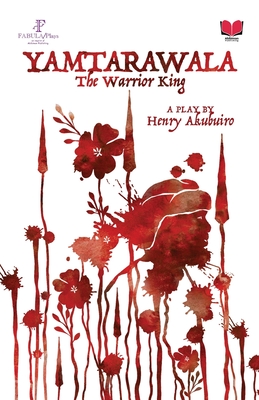Akubuiro’s ‘Yamtarawala – The Warrior King’: Chasing a kingdom in dramatic historicisation

By Anote Ajeluorou
WHAT does it mean to found a kingdom? What circumstances force a man to leave home in quest of another abode away from perceived injustice from a place he regards as home? And what price should he pay to realise his kingdom quest and at whose expense should the kingdom be established? And having found a kingdom, what next? What leadership model can we learn from Yamtarawala beyond gaining political power? Glory. Conquest. Satisfaction. Justice. These are some of the heady brews founding a kingdom can fetch those who manage the craft well. But there’s always a catch: founding a kingdom is no mean feat, as building an empire also means spilling a lot of blood. How do blood ties play out in the deft scheming for an empire and its outcome? This is the dramatic preoccupation of Henry Akubuiro’s Yamtarawala – The Warrior King (Abibiman Publishing, London, UK; 2023).
This is the stark irony that unfolds before Abdullahi, also known as Yamtarawala, as he’s passed over in the succession to his ‘father’s’ throne in Ngazagamu, capital of Kanem-Bornu Empire. Although generally believed to be the first son, his younger brother Umar gets the spiritual nod to be king. Last minute testimony by the late king’s guards expose Yamtarawala as a bastard son and unfit to inherit the great throne. His mother was captured in faraway Yemen and brought to the palace before becoming a queen, and believed to have been pregnant with him before arriving Ngazagamu. In anger Yamtarawala storms out with 72 of his loyalists, after promising everyone that he would be an important chief one day, and left to found his own kingdom that would rival Kanem-Borno Empire. With Galadima as his faithful military ally, Yamta the great embarks on a conquering spree of adjourning kingdoms that extend away and outside the sphere of the capital, Ngazagamu. From Mandaragrua to Miringa and Gur, Buratai and then to Diwar, which became the culmination of his empire quest, a sprawling empire that almost rivals the Kanem-Bornu Empire where he was driven and denied becoming king is founded.
Yamtarawala’s life is indeed a mystery. Born a prince of one kingdom into another and denied being king, he sets out to found his own kingdom. His mother, Asga, is a character study of a woman whose destiny is steeped in royalty. A twice enslaved woman who becomes a queen on both counts, and takes the pregnancy of Yamtarawala with her to another kingdom and gifts it to her new king for whom she also becomes a queen – all the way from Yemen to Kanem-Bornu Enpire. This is the story of a mother and son for whom royalty runs in their blood, and who keep dates with royal destinies, as they find themselves tossed from one kingdom to yet another.
All these conquests Yamtarawala attained, not only because of his strong fighting force, but also because of his guile and romantic liaisons. In each of those territories, their armies were back by powerful juju that always repelled Yamtarawala and his men from taking the kingdoms at first attempt. But soon Yamtarawala would discover the nature of juju fortification, and set about dismantling it, mostly with the help of princesses from each kingdom whom he’d woo to his side, who would then disclose to him the secret of the kingdom’s strong juju and how to dismantle it. In fact, Yamtarawala’s romantic guiles to unearth the various juju that Mandaragrua, Miringa and Diwar deployed to fortify their kingdoms against external aggressions form a large chunk of the dramaturgy of Yamtarawala – The Warrior King.

But Yamtarawala is a smart man or so he believed. Having been crowned king and settled into his royal role at Diwar, he suddenly feels uncomfortable with his own children and decides to put them to an unusual test of loyalty. He recalls how he was able to conquer the various kingdoms, the ugly roles the children of those kings unwittingly played to enable him discover the secret behind their initial invincibility from external aggression. He does not want to fall to such dirty tricks, with his own children as ally to military adventurists; he knows how vulnerable a king can be if a chink can be found among members of the royal household. So Yamtarawala sets a stone to boil in a pot and asks his children to pick it up with a fork if it goes soft. Only his youngest son Marivirahyel among his six children is able to perform the unusual feat. Yamtarawala is alarmed that his own son has become so powerfully fortified with juju and could possibly challenge him and stake a claim to the throne. He then sends men to kill him, but Marivirayhel is an unusual young man, much to his father’s dismay.
How does Yamtarawala take this ugly turn of events in his own household? How does this lead to the unravelling of his kingship and kingdom? In Yamtarawala – The Warrior King, Akubuiro revs up the tragic history of a man on the quest of a dream, the quest of an empire after he’d been denied one. Just when he has succeeded, he finds that his heroism is just as hollow as his quest, haunted now by his own empire-building sleuth of hand tactics that also begin to stare him in the face from the most unlikely quarter. Yamtarawala succeeded phenomenally in the strategic war tactics, but failed fantastically in the politics of domestic governance, which would confound and lead to his capitulation.
Akubuiro deploys the narrator technique to bring his audience up to speed on the sequence of events in the past to the moment when when there’s contestation for the throne of Kanem-Bornu Empire with Abdullahi (Yamtarawala) oitted against his younger brother, Umar. Akubuiro’s play is a restorative historical work that excavates a forgotten kingdom from the dust of relative obscurity and lifts it into national consciousness and reckoning. Akubuiro’s sprawling dramatic offering deserves our praise.



